China Brands, Marketing & Consumers
The Achilles Heel of Zibo: Why Zibo’s Strength Is Also Its Weakness
As the entire country is watching how the Zibo BBQ hype has been unfolding, every little thing can create an online storm.
Published
1 year agoon
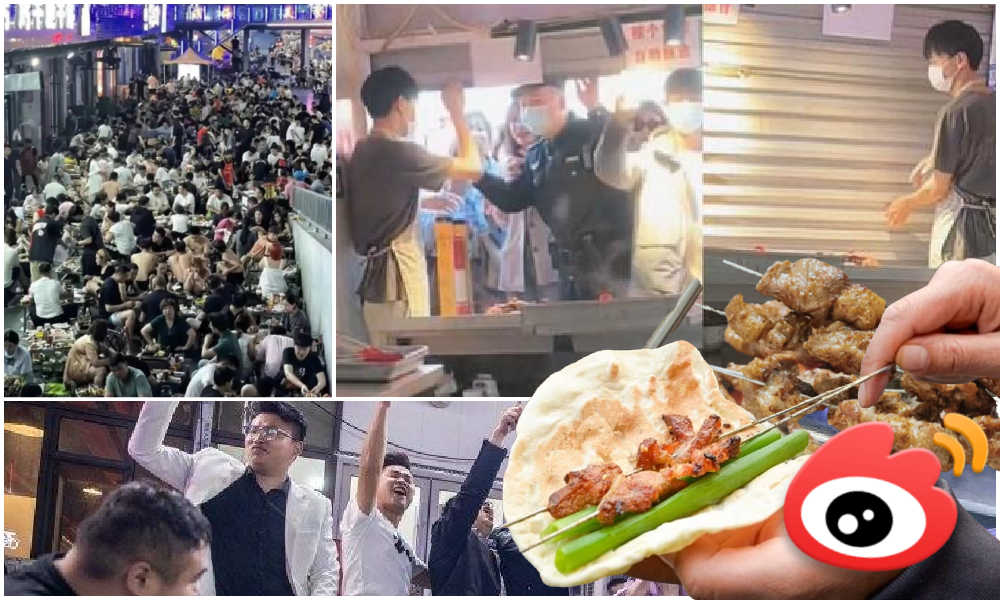
It’s like a Shandong ‘Disneyland,’ but with more people and longer lines. The city of Zibo has become a major tourist attraction, filled with lively atmosphere, cheap BBQ, and friendly people. But local business owners also face the downsides of operating in a city that has become so extremely popular.
The city of Zibo just keeps trending. After the Shandong city – known for its BBQ – suddenly became an online sensation and a super popular destination among young Chinese travelers, there has been a lot of discussion surrounding it.
The trend basically started with viral videos showing festive party scenes from Zibo in early April. After spending time in Zibo during ‘zero Covid’ quarantine, groups of Shandong students had returned to the city, allegedly as a way to thank Zibo for their hospitality and to boost local economy.
As Zibo BBQ scenes went trending, the snowball effect had begun and more people flocked to the city, wanting to get in on the hype and experience a night of Zibo BBQ themselves.
Zibo’s city marketing played a crucial role in promoting the trend, as they arranged special ‘Zibo BBQ’ high-speed trains (烧烤专列) and ‘BBQ buses’ – including souvenir gift bags – to enable convenient and fast travel for those coming to visit the city. They organized groups of volunteer service teams on the streets to assist and made sure police and medical teams are on standby at all hours of the day.
Chinese state media further boosted the Zibo trend by highlighting its success as a sign of post-Covid economic recovery of local tourism.

A Xinhua post about Zibo on Twitter, May 6, 2023.
Initially, online discussions focused on the lively scenes from Zibo and on how the city had managed to become such a viral hit.
But over the past week, there have been trending discussions that focus more on the downside of Zibo’s popularity. We previously translated a critical essay by Song Zhibiao which was (re)posted by Chinese professor Liu Yadong. The article condemned the Zibo hype for being superficial a sign of a greater societal problem.
Now, there is more focus on how the BBQ hype is affecting local business owners and residents. The “victims” (“受害者“) of Zibo’s sudden popularity are overworked BBQ sellers and those who lost their peaceful lifestyle in the industrial city due to tourists overcrowding the streets.
One of the reasons why Zibo’s popularity has raised so many questions is because the city was actually never known as a tourist destination. Its history and food culture were not particularly famous.
Actually, Zibo’s BBQ hype is not about a long-standing or renowned barbecue culture at all – it is about the lively atmosphere and social spectacle that comes with the BBQ scene, which mostly became a hit among domestic tourists due to the reputation of Zibo business owners being friendly and hospitable, and the prices being low.
But it is exactly those things, namely the city’s hype and its reputation for being cheap and friendly, that are are also its Achilles heel.
Low Prices, High Expectations
On May 4th, one Weibo post by a blogger who visited Zibo attracted a lot of online attention (#24人吃淄博烧烤花760元#). The person, a Shanghai-based creator with 1,5 million followers, described how they had spent 760 yuan ($110) on a Zibo BBQ dinner with a group of 24 people, so spending just a little over 30 yuan (or $4.5) per person.
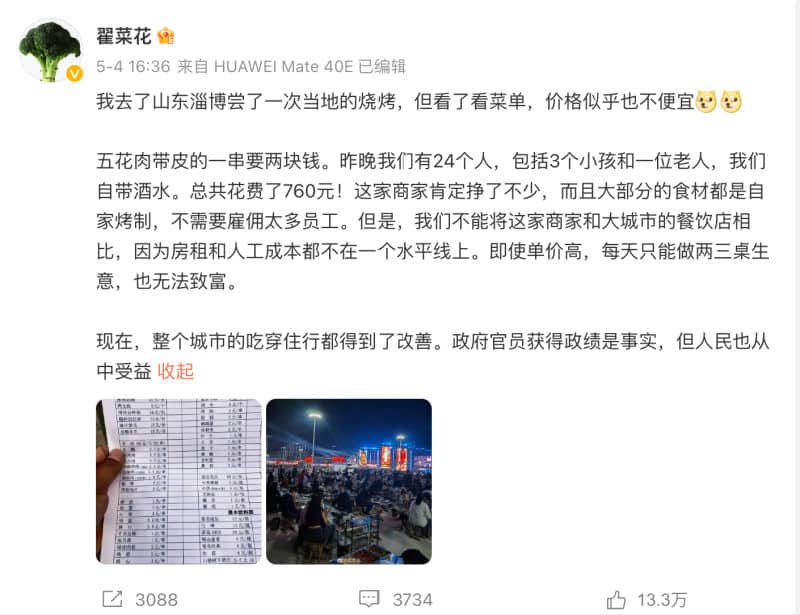
Despite the low price, the blogger suggested that the prices in Zibo were “expensive” and that “the business owner must have made a lot of money.”
The post triggered a lot of discussion on the unrealistic expectations people have of Zibo. One top commenter wondered if the blogger had expected to receive money for having BBQ dinner with 24 people.
The blogger later apologized, saying that the sarcastic tone of the post had been misunderstood and the prices in Zibo actually are low and affordable.
The entire topic led to online discussions about people having unrealistic expectations about prices in Zibo, which then led to more people saying they would like to go to Zibo – only futher accelerating the trend.
Tempest in a Teapot
With all eyes on Zibo, it seems that any small issue can cause a social media storm these days.
One woman recently posted about finding a blade in her Zibo food, attracting a lot of attention. Although many netizens believed the post was fake and only done for clout, it did lead to local authorities investigating the case.
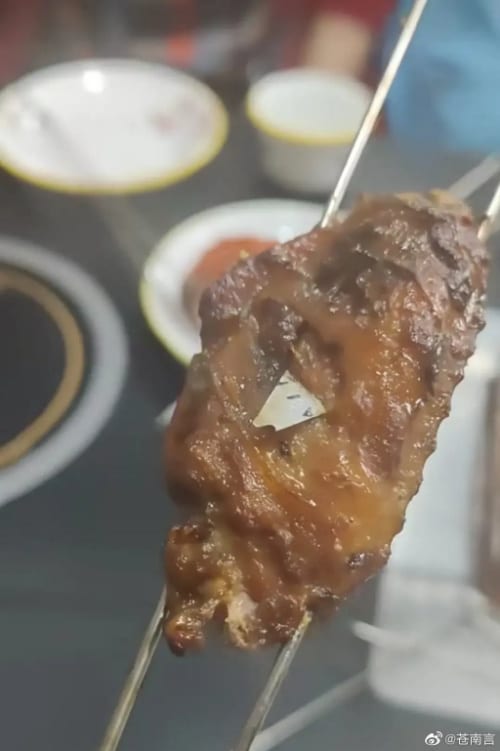
A post about finding a blade in Zibo bbq food went viral.
Another shop owner also became a victim of a blogger trying to smear her Lao Sun BBQ Restaurant business. On a night in April, a female tourist dined at the restaurant and took a drink and cookies from the restaurant without asking. When the boss charged her for it as part of the bill, she became upset and accused the shop of overcharging her for dipping sauce.
The issue became so big that the BBQ restaurant, that has been in business for three decades, started receiving thousands of harassing phone calls and abusive comments. Their shop was even temporarily blacklisted by local authorities before the owner could set the record straight (link).
Then there was a viral story about a local shop owner turning customers away due to limited capacity, and being accused of purposely discriminating against non-local visitors.
The owner broke down and apologized on his knees, allegedly because he felt he needed to uphold Zibo’s reputation (video). According to Chinese media, he has only been sleeping four hours every night in light of the Zibo craze.
When Hype Goes Wrong
For some, the Zibo craze has gone so far that they can no longer safely operate their business.
One small BBQ shop in Zibo recently went viral after its owner was filmed enjoying some quiet time in a folding lounge chair while his restaurant was empty. As soon as the video spread on social media, the shop’s name and location were shared, and people flocked to the location.

The owner of a small Zibo restaurant (金岭日日鲜牛肉店铺) was filmed chilling in his lounge chair.
In a matter of days, the store found itself unable to cope with the influx of people, leading the owner to declare that the shop was swamped and incapable of servicing such a large number of customers. The neighboring streets were unable to accommodate the traffic.
If you now search for the store on Douyin, you’ll find dozens of videos showing vloggers in front of the small restaurant and customers already lining up in front of it at 6.30 in the morning.
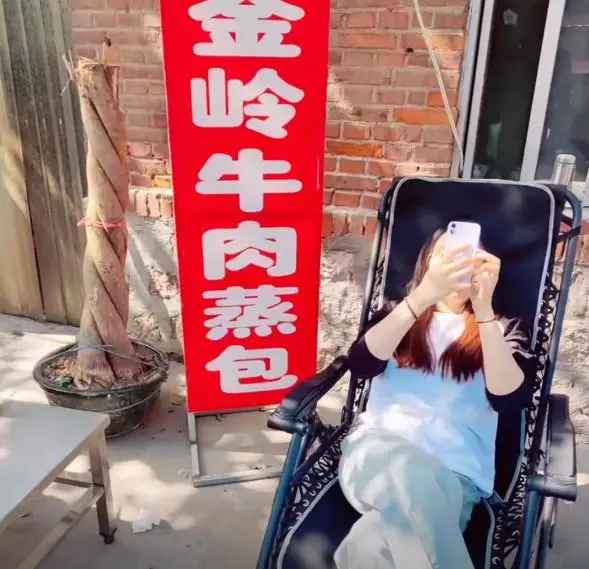
Visitor posing in the lounge chair in which the business owner was relaxing in a video that went viral.
Another case that went particularly trending is that of a business owner named Yi Yang selling duck in Zibo. In late April, one female visitor made a video while visiting his shop in which she asked Yi Yang if she could touch his muscles. After Yi Yang nodded, the woman reached out and touched his muscles.

Screenshots of the video through which Yi Yang unwillingly became an online celebrity.
This video then went viral and turned Yi Yang into an overnight celebrity. Although his hit status initially boosted sales, the crowds of people coming to his shop soon became so overwhelming that he could no longer run his business as usual (see video). As thousands of people came by his shop at all hours of the day, some even started harassing and physically assaulting the small business owner to get a chance to take photos with him.


As thousands of people gathered around his shop, Yi Yang was unable to continue working and closed his business.
As Yi Yang’s business temporarily closed, he is seeing significant losses and recently did a livestream in which he got choked up over his predicament (#淄博鸭头小哥直播中气到落泪#).
Party newspaper People’s Daily even published an article about the issue, condemning the exploitation of those who suddenly go viral overnight.
Time for Zibo to Cool Down?
From blocked streets to overworked shop owners, there are many signs that it is time for Zibo’s hype to cool down a bit. With the May day holiday behind us and the Zibo trend reaching its peak, this might inevitably happen anyway.
Some business owners have their own approach to making sure their shop is not hyped too much. One BBQ seller recently attracted attention for leaving 17 negative online reviews on his own business. It actually did not work: the system marked them as spam, deleted them, and it went viral anyway (#烧烤店老板为劝退游客自刷17个差评#).
Despite recent worries surrounding Zibo’s popularity, there are also many people who hope that other cities in China can also replicate its success, calling the ‘Zibo phenomenon’ the “hope of China” and a sign of a promising future for other smaller cities.
Financial writer Wu Xiaobo (吴晓波) recently wrote an article (“The Metaphor of Zibo BBQ”/”淄博烧烤的隐喻“) in which he stated that the popularity of Zibo represents a new model of democratic, free market governance that emphasizes public participation and shared responsibility, facilitated by the local government.
However, Weibo knowledge blogger ‘PYGZ’ (@平原公子赵胜) disagrees. In his recent Weibo post, he argues that people should not be naieve about Zibo’s success. According to PYGZ, the city’s popularity is not so much about the people and a free market, but about the government and strict oversight.
PYGZ points out that Zibo’s success can be attributed to its government’s implementation of special tourist transport, a ban on hotel price increases, police patrol teams, food quality control, countermeasures to an inflation in prices, ensuring fair treatment of tourists, and many other top-down measures. According to PYGZ, Zibo has flourished not because the government has let go of control, but because it has strongly overseen the latest developments.
Viewing Zibo’s success in this light, the government is likely to guide and counter the overhype of the city. Eventually, the cooling down of the Zibo trend will result from a combination of factors, including the waning of social media frenzy, the government’s efforts to control the hype and promote a more sustainable trend, and business owners taking necessary measures to get some much-needed rest.
By Manya Koetse, with contributions by Zilan Qian
Get the story behind the hashtag. Subscribe to What’s on Weibo here to receive our newsletter and get access to our latest articles:
Spotted a mistake or want to add something? Please let us know in comments below or email us. First-time commenters, please be patient – we will have to manually approve your comment before it appears.
©2023 Whatsonweibo. All rights reserved. Do not reproduce our content without permission – you can contact us at info@whatsonweibo.com.
Manya Koetse is the founder and editor-in-chief of whatsonweibo.com. She is a writer, public speaker, and researcher (Sinologist, MPhil) on social trends, digital developments, and new media in an ever-changing China, with a focus on Chinese society, pop culture, and gender issues. She shares her love for hotpot on hotpotambassador.com. Contact at manya@whatsonweibo.com, or follow on Twitter.

Also Read
China Books & Literature
Why Chinese Publishers Are Boycotting the 618 Shopping Festival
Bookworms love to get a good deal on books, but when the deals are too good, it can actually harm the publishing industry.
Published
2 months agoon
June 8, 2024By
Ruixin Zhang
JD.com’s 618 shopping festival is driving down book prices to such an extent that it has prompted a boycott by Chinese publishers, who are concerned about the financial sustainability of their industry.
When June begins, promotional campaigns for China’s 618 Online Shopping Festival suddenly appear everywhere—it’s hard to ignore.
The 618 Festival is a product of China’s booming e-commerce culture. Taking place annually on June 18th, it is China’s largest mid-year shopping carnival. While Alibaba’s “Singles’ Day” shopping festival has been taking place on November 11th since 2009, the 618 Festival was launched by another Chinese e-commerce giant, JD.com (京东), to celebrate the company’s anniversary, boost its sales, and increase its brand value.
By now, other e-commerce platforms such as Taobao and Pinduoduo have joined the 618 Festival, and it has turned into another major nationwide shopping spree event.
For many book lovers in China, 618 has become the perfect opportunity to stock up on books. In previous years, e-commerce platforms like JD.com and Dangdang (当当) would roll out tempting offers during the festival, such as “300 RMB ($41) off for every 500 RMB ($69) spent” or “50 RMB ($7) off for every 100 RMB ($13.8) spent.”
Starting in May, about a month before 618, the largest bookworm community group on the Douban platform, nicknamed “Buying Like Landsliding, Reading Like Silk Spinning” (买书如山倒,看书如抽丝), would start buzzing with activity, discussing book sales, comparing shopping lists, or sharing views about different issues.

Social media users share lists of which books to buy during the 618 shopping festivities.
This year, however, the mood within the group was different. Many members posted that before the 618 season began, books from various publishers were suddenly taken down from e-commerce platforms, disappearing from their online shopping carts. This unusual occurrence sparked discussions among book lovers, with speculations arising about a potential conflict between Chinese publishers and e-commerce platforms.
A joint statement posted in May provided clarity. According to Chinese media outlet The Paper (@澎湃新闻), eight publishers in Beijing and the Shanghai Publishing and Distribution Association, which represent 46 publishing units in Shanghai, issued a statement indicating they refuse to participate in this year’s 618 promotional campaign as proposed by JD.com.
The collective industry boycott has a clear motivation: during JD’s 618 promotional campaign, which offers all books at steep discounts (e.g., 60-70% off) for eight days, publishers lose money on each book sold. Meanwhile, JD.com continues to profit by forcing publishers to sell books at significantly reduced prices (e.g., 80% off). For many publishers, it is simply not sustainable to sell books at 20% of the original price.
One person who has openly spoken out against JD.com’s practices is Shen Haobo (沈浩波), founder and CEO of Chinese book publisher Motie Group (磨铁集团). Shen shared a post on WeChat Moments on May 31st, stating that Motie has completely stopped shipping to JD.com as it opposes the company’s low-price promotions. Shen said it felt like JD.com is “repeatedly rubbing our faces into the ground.”
Nevertheless, many netizens expressed confusion over the situation. Under the hashtag topic “Multiple Publishers Are Boycotting the 618 Book Promotions” (#多家出版社抵制618图书大促#), people complained about the relatively high cost of physical books.
With a single legitimate copy often costing 50-60 RMB ($7-$8.3), and children’s books often costing much more, many Chinese readers can only afford to buy books during big sales. They question the justification for these rising prices, as books used to be much more affordable.
Book blogger TaoLangGe (@陶朗歌) argues that for ordinary readers in China, the removal of discounted books is not good news. As consumers, most people are not concerned with the “life and death of the publishing industry” and naturally prefer cheaper books.
However, industry insiders argue that a “price war” on books may not truly benefit buyers in the end, as it is actually driving up the prices as a forced response to the frequent discount promotions by e-commerce platforms.
China News (@中国新闻网) interviewed publisher San Shi (三石), who noted that people’s expectations of book prices can be easily influenced by promotional activities, leading to a subconscious belief that purchasing books at such low prices is normal. Publishers, therefore, feel compelled to reduce costs and adopt price competition to attract buyers. However, the space for cost reduction in paper and printing is limited.
Eventually, this pressure could affect the quality and layout of books, including their binding, design, and editing. In the long run, if a vicious cycle develops, it would be detrimental to the production and publication of high-quality books, ultimately disappointing book lovers who will struggle to find the books they want, in the format they prefer.
This debate temporarily resolved with JD.com’s compromise. According to The Paper, JD.com has started to abandon its previous strategy of offering extreme discounts across all book categories. Publishers now have a certain degree of autonomy, able to decide the types of books and discount rates for platform promotions.
While most previously delisted books have returned for sale, JD.com’s silence on their official social media channels leaves people worried about the future of China’s publishing industry in an era dominated by e-commerce platforms, especially at a time when online shops and livestreamers keep competing over who has the best book deals, hyping up promotional campaigns like ‘9.9 RMB ($1.4) per book with free shipping’ to ‘1 RMB ($0.15) books.’
This year’s developments surrounding the publishing industry and 618 has led to some discussions that have created more awareness among Chinese consumers about the true price of books. “I was planning to bulk buy books this year,” one commenter wrote: “But then I looked at my bookshelf and saw that some of last year’s books haven’t even been unwrapped yet.”
Another commenter wrote: “Although I’m just an ordinary reader, I still feel very sad about this situation. It’s reasonable to say that lower prices are good for readers, but what I see is an unfavorable outlook for publishers and the book market. If this continues, no one will want to work in this industry, and for readers who do not like e-books and only prefer physical books, this is definitely not a good thing at all!”
By Ruixin Zhang, edited with further input by Manya Koetse
Independently reporting China trends for over a decade. Like what we do? Support us and get the story behind the hashtag by subscribing:
Spotted a mistake or want to add something? Please let us know in comments below or email us. First-time commenters, please be patient – we will have to manually approve your comment before it appears.
©2024 Whatsonweibo. All rights reserved. Do not reproduce our content without permission – you can contact us at info@whatsonweibo.com.
China Brands, Marketing & Consumers
Chinese Sun Protection Fashion: Move over Facekini, Here’s the Peek-a-Boo Polo
From facekini to no-face hoodie: China’s anti-tan fashion continues to evolve.
Published
2 months agoon
June 6, 2024
It has been ten years since the Chinese “facekini”—a head garment worn by Chinese ‘aunties’ at the beach or swimming pool to prevent sunburn—went international.
Although the facekini’s debut in French fashion magazines did not lead to an international craze, it did turn the term “facekini” (脸基尼), coined in 2012, into an internationally recognized word.

The facekini went viral in 2014.
In recent years, China has seen a rise in anti-tan, sun-protection garments. More than just preventing sunburn, these garments aim to prevent any tanning at all, helping Chinese women—and some men—maintain as pale a complexion as possible, as fair skin is deemed aesthetically ideal.
As temperatures are soaring across China, online fashion stores on Taobao and other platforms are offering all kinds of fashion solutions to prevent the skin, mainly the face, from being exposed to the sun.

One of these solutions is the reversed no-face sun protection hoodie, or the ‘peek-a-boo polo,’ a dress shirt with a reverse hoodie featuring eye holes and a zipper for the mouth area.

This sun-protective garment is available in various sizes and models, with some inspired by or made by the Japanese NOTHOMME brand. These garments can be worn in two ways—hoodie front or hoodie back. Prices range from 100 to 280 yuan ($13-$38) per shirt/jacket.

The no-face hoodie sun protection shirt is sold in various colors and variations on Chinese e-commerce sites.
Some shops on Taobao joke about the extreme sun-protective fashion, writing: “During the day, you don’t know which one is your wife. At night they’ll return to normal and you’ll see it’s your wife.”

On Xiaohongshu, fashion commenters note how Chinese sun protective clothing has become more extreme over the past few years, with “sunburn protection warriors” (防晒战士) thinking of all kinds of solutions to avoid a tan.

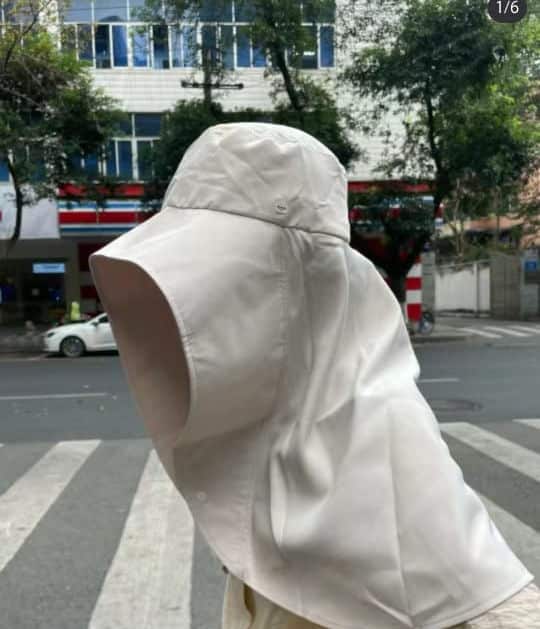


Although there are many jokes surrounding China’s “sun protection warriors,” some people believe they are taking it too far, even comparing them to Muslim women dressed in burqas.
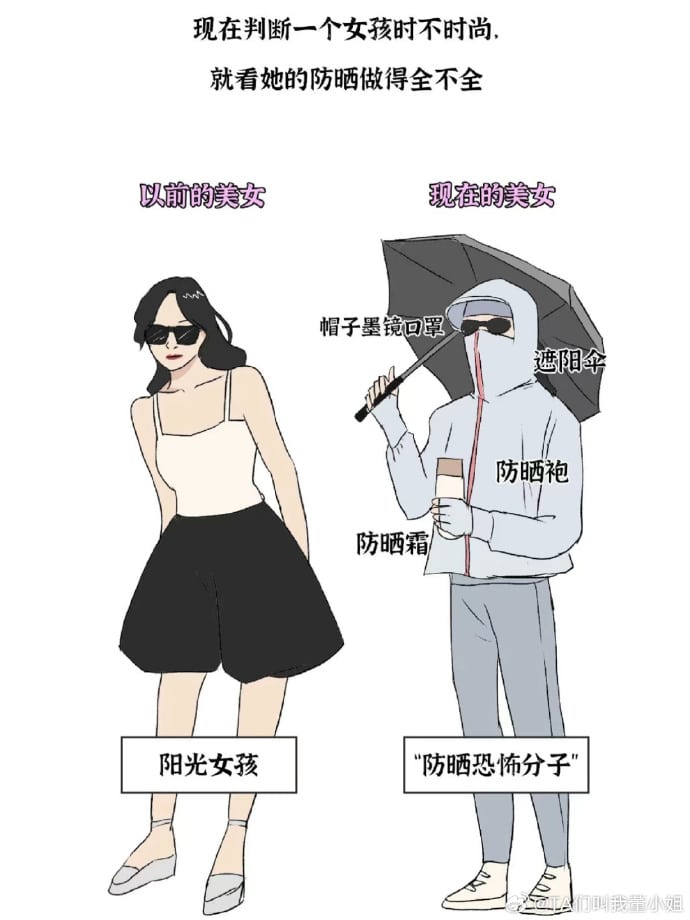
Image shared on Weibo by @TA们叫我董小姐, comparing pretty girls before (left) and nowadays (right), also labeled “sunscreen terrorists.”
Some Xiaohongshu influencers argue that instead of wrapping themselves up like mummies, people should pay more attention to the UV index, suggesting that applying sunscreen and using a parasol or hat usually offers enough protection.
By Manya Koetse, with contributions by Miranda Barnes
Spotted a mistake or want to add something? Please let us know in comments below or email us. First-time commenters, please be patient – we will have to manually approve your comment before it appears.
©2024 Whatsonweibo. All rights reserved. Do not reproduce our content without permission – you can contact us at info@whatsonweibo.com.
Subscribe

Weibo Watch: The Future is Here

“Bye Bye Biden”: Biden’s Many Nicknames in Chinese

Enjoying the ‘Sea’ in Beijing’s Ditan Park

A Triumph for “Comrade Trump”: Chinese Social Media Reactions to Trump Rally Shooting

Weibo Watch: Get Up, Stand Up

The Tragic Story of “Fat Cat”: How a Chinese Gamer’s Suicide Went Viral

“Old Bull Eating Young Grass”: 86-Year-Old Chinese Painter Fan Zeng Marries 36-Year-Old Xu Meng

A Brew of Controversy: Lu Xun and LELECHA’s ‘Smoky’ Oolong Tea

Singing Competition or Patriotic Fight? Hunan TV’s ‘Singer 2024’ Stirs Nationalistic Sentiments

Zara Dress Goes Viral in China for Resemblance to Haidilao Apron

Weibo Watch: The Battle for the Bottom Bed

About the “AI Chatbot Based on Xi Jinping” Story

China’s Intensified Social Media Propaganda: “Taiwan Must Return to Motherland”

Weibo Watch: Telling China’s Stories Wrong

Saying Goodbye to “Uncle Wang”: Wang Wenbin Becomes Chinese Ambassador to Cambodia
Get in touch
Would you like to become a contributor, or do you have any tips or suggestions? Get in touch here!
Popular Reads
-

 China Insight3 months ago
China Insight3 months agoThe Tragic Story of “Fat Cat”: How a Chinese Gamer’s Suicide Went Viral
-

 China Music4 months ago
China Music4 months agoThe Chinese Viral TikTok Song Explained (No, It’s Not About Samsung)
-

 China Digital10 months ago
China Digital10 months agoToo Sexy for Weibo? Online Discussions on the Concept of ‘Cābiān’
-

 China Arts & Entertainment12 months ago
China Arts & Entertainment12 months agoBehind 8 Billion Streams: Who is Dao Lang Cursing in the Chinese Hit Song ‘Luocha Kingdom’?




